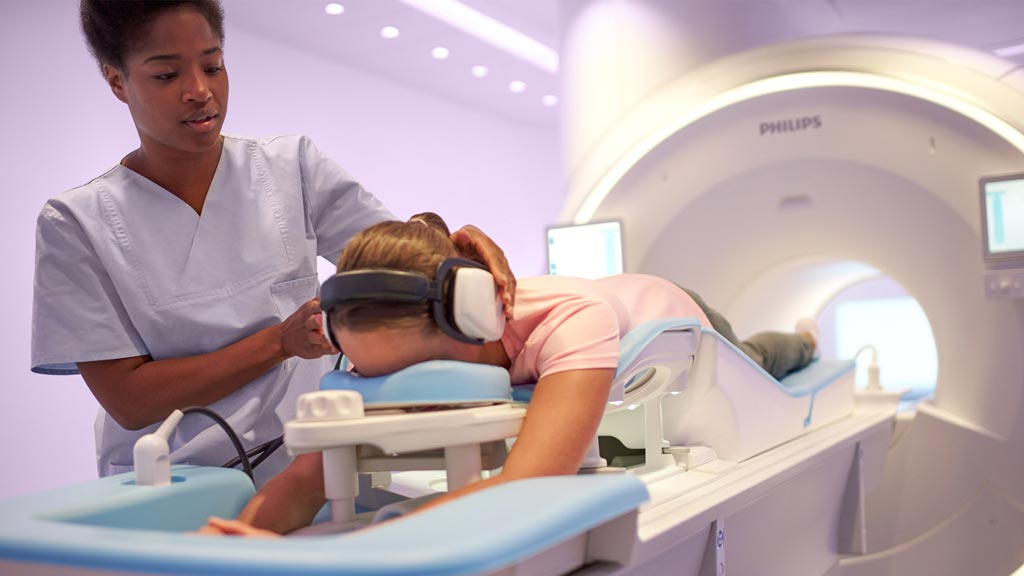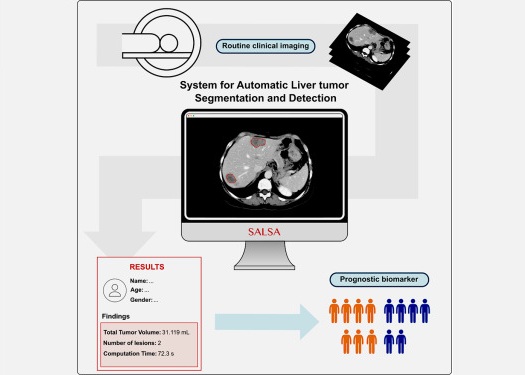New MRI Device Offers Fully Guided Patient Setup
|
By MedImaging International staff writers Posted on 24 Jun 2018 |

Image: The Ingenia Elition 3T MRI scanner (Photo courtesy of Royal Philips).
A new magnetic resonance imaging (MRI) scanner and an integrated suite of software innovations enable clinicians to perform exams up to 50% faster without compromising image quality.
The Royal Philips (Amsterdam, The Netherlands) Ingenia Elition 3T MRI scanner presents a patient-centric imaging experience from initial set-up to final image. The system features the VitalScreen user interface for workflow optimization, which provides operators with fully guided patient setup, and VitalEye, which senses the patient and detects breathing automatically, without the need for operator interaction. Using both technologies allows a routine examination to be launched in less than a minute, significantly improving scanner utilization.
Other features include SmartExam capability, an artificial intelligence (AI) platform for the planning, scanning, and processing of scans; dStream digital broadband technology; 3D APT, a contrast-free brain MRI solution that differentiates low-grade and high-grade gliomas; compressed SENSE, which reduces scan time by 50% while delivering sharp images for all 2D and 3D scans in all anatomies with anatomical contrasts; and the Philips Ambient Experience and Connect solution, which engages the patient using video and audio to reduce the claustrophobic experience and the need for rescans.
“As value-based care initiatives challenge healthcare organizations to drive better outcomes, radiology departments are specifically caught between ever-increasing imaging volume demands, while also facing pressure to engage more deeply with both referring physicians and patients,” said Arjen Radder, global business leader for MRI at Philips. “Philips is responding to these challenges through the development of solutions such as Ingenia Elition to improve image quality and the patient and staff experience, as well as operational efficiency.”
“To deliver fast, consistent and accurate diagnoses, our staff need to be supported with technology that gives them the ability to provide the best patient care, in an efficient and cost-effective way,” said Chip Truwit, MD, chair of radiology at Hennepin Healthcare. “Philips' Ingenia Elition plays a critical role in elevating the standard of care for our patients in imaging and in improving overall operations in our new imaging center.”
The Royal Philips (Amsterdam, The Netherlands) Ingenia Elition 3T MRI scanner presents a patient-centric imaging experience from initial set-up to final image. The system features the VitalScreen user interface for workflow optimization, which provides operators with fully guided patient setup, and VitalEye, which senses the patient and detects breathing automatically, without the need for operator interaction. Using both technologies allows a routine examination to be launched in less than a minute, significantly improving scanner utilization.
Other features include SmartExam capability, an artificial intelligence (AI) platform for the planning, scanning, and processing of scans; dStream digital broadband technology; 3D APT, a contrast-free brain MRI solution that differentiates low-grade and high-grade gliomas; compressed SENSE, which reduces scan time by 50% while delivering sharp images for all 2D and 3D scans in all anatomies with anatomical contrasts; and the Philips Ambient Experience and Connect solution, which engages the patient using video and audio to reduce the claustrophobic experience and the need for rescans.
“As value-based care initiatives challenge healthcare organizations to drive better outcomes, radiology departments are specifically caught between ever-increasing imaging volume demands, while also facing pressure to engage more deeply with both referring physicians and patients,” said Arjen Radder, global business leader for MRI at Philips. “Philips is responding to these challenges through the development of solutions such as Ingenia Elition to improve image quality and the patient and staff experience, as well as operational efficiency.”
“To deliver fast, consistent and accurate diagnoses, our staff need to be supported with technology that gives them the ability to provide the best patient care, in an efficient and cost-effective way,” said Chip Truwit, MD, chair of radiology at Hennepin Healthcare. “Philips' Ingenia Elition plays a critical role in elevating the standard of care for our patients in imaging and in improving overall operations in our new imaging center.”
Latest MRI News
- Cutting-Edge MRI Technology to Revolutionize Diagnosis of Common Heart Problem
- New MRI Technique Reveals True Heart Age to Prevent Attacks and Strokes
- AI Tool Predicts Relapse of Pediatric Brain Cancer from Brain MRI Scans
- AI Tool Tracks Effectiveness of Multiple Sclerosis Treatments Using Brain MRI Scans
- Ultra-Powerful MRI Scans Enable Life-Changing Surgery in Treatment-Resistant Epileptic Patients
- AI-Powered MRI Technology Improves Parkinson’s Diagnoses
- Biparametric MRI Combined with AI Enhances Detection of Clinically Significant Prostate Cancer
- First-Of-Its-Kind AI-Driven Brain Imaging Platform to Better Guide Stroke Treatment Options
- New Model Improves Comparison of MRIs Taken at Different Institutions
- Groundbreaking New Scanner Sees 'Previously Undetectable' Cancer Spread
- First-Of-Its-Kind Tool Analyzes MRI Scans to Measure Brain Aging
- AI-Enhanced MRI Images Make Cancerous Breast Tissue Glow
- AI Model Automatically Segments MRI Images
- New Research Supports Routine Brain MRI Screening in Asymptomatic Late-Stage Breast Cancer Patients
- Revolutionary Portable Device Performs Rapid MRI-Based Stroke Imaging at Patient's Bedside
- AI Predicts After-Effects of Brain Tumor Surgery from MRI Scans
Channels
Radiography
view channel
AI Improves Early Detection of Interval Breast Cancers
Interval breast cancers, which occur between routine screenings, are easier to treat when detected earlier. Early detection can reduce the need for aggressive treatments and improve the chances of better outcomes.... Read more
World's Largest Class Single Crystal Diamond Radiation Detector Opens New Possibilities for Diagnostic Imaging
Diamonds possess ideal physical properties for radiation detection, such as exceptional thermal and chemical stability along with a quick response time. Made of carbon with an atomic number of six, diamonds... Read moreUltrasound
view channel.jpeg)
AI-Powered Lung Ultrasound Outperforms Human Experts in Tuberculosis Diagnosis
Despite global declines in tuberculosis (TB) rates in previous years, the incidence of TB rose by 4.6% from 2020 to 2023. Early screening and rapid diagnosis are essential elements of the World Health... Read more
AI Identifies Heart Valve Disease from Common Imaging Test
Tricuspid regurgitation is a condition where the heart's tricuspid valve does not close completely during contraction, leading to backward blood flow, which can result in heart failure. A new artificial... Read moreNuclear Medicine
view channel
Novel Radiolabeled Antibody Improves Diagnosis and Treatment of Solid Tumors
Interleukin-13 receptor α-2 (IL13Rα2) is a cell surface receptor commonly found in solid tumors such as glioblastoma, melanoma, and breast cancer. It is minimally expressed in normal tissues, making it... Read more
Novel PET Imaging Approach Offers Never-Before-Seen View of Neuroinflammation
COX-2, an enzyme that plays a key role in brain inflammation, can be significantly upregulated by inflammatory stimuli and neuroexcitation. Researchers suggest that COX-2 density in the brain could serve... Read moreGeneral/Advanced Imaging
view channel
CT-Based Deep Learning-Driven Tool to Enhance Liver Cancer Diagnosis
Medical imaging, such as computed tomography (CT) scans, plays a crucial role in oncology, offering essential data for cancer detection, treatment planning, and monitoring of response to therapies.... Read more
AI-Powered Imaging System Improves Lung Cancer Diagnosis
Given the need to detect lung cancer at earlier stages, there is an increasing need for a definitive diagnostic pathway for patients with suspicious pulmonary nodules. However, obtaining tissue samples... Read moreImaging IT
view channel
New Google Cloud Medical Imaging Suite Makes Imaging Healthcare Data More Accessible
Medical imaging is a critical tool used to diagnose patients, and there are billions of medical images scanned globally each year. Imaging data accounts for about 90% of all healthcare data1 and, until... Read more
Global AI in Medical Diagnostics Market to Be Driven by Demand for Image Recognition in Radiology
The global artificial intelligence (AI) in medical diagnostics market is expanding with early disease detection being one of its key applications and image recognition becoming a compelling consumer proposition... Read moreIndustry News
view channel
GE HealthCare and NVIDIA Collaboration to Reimagine Diagnostic Imaging
GE HealthCare (Chicago, IL, USA) has entered into a collaboration with NVIDIA (Santa Clara, CA, USA), expanding the existing relationship between the two companies to focus on pioneering innovation in... Read more
Patient-Specific 3D-Printed Phantoms Transform CT Imaging
New research has highlighted how anatomically precise, patient-specific 3D-printed phantoms are proving to be scalable, cost-effective, and efficient tools in the development of new CT scan algorithms... Read more
Siemens and Sectra Collaborate on Enhancing Radiology Workflows
Siemens Healthineers (Forchheim, Germany) and Sectra (Linköping, Sweden) have entered into a collaboration aimed at enhancing radiologists' diagnostic capabilities and, in turn, improving patient care... Read more





















